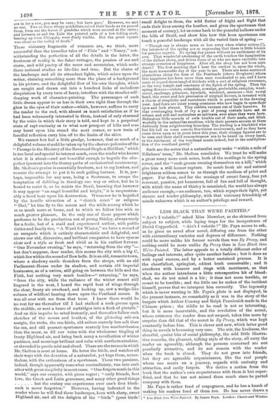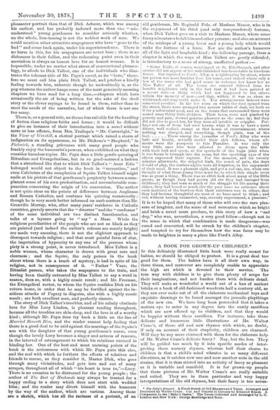LESS BLACK THAN WE'RE PAINTED.*
" AIN'T I volatile ?" asked Miss Mowcher, as she skimmed from subject to subject, while laying traps for the inexperience of David Copperfield. "Ain't I volatile ?" Mr. Payn seems to ask, as he gives us novel after novel, differing one from the other with extraordinary varieties and degrees of difference. Nothing could be more unlike his former novels than was By Proxy, and nothing could be more unlike By Proxy than is Less Black than iVe're Painted. The latter appeals to a totally different order of feelings and interests, after quite another fashion ; but it does so with equal success, and by a better sustained process. It is the cheerfullest, springiest, oddest book conceivable ; and it overflows with humour and rings with merriment, so that when the author introduces a little retrospective bit of blood- shed, we do not mind it a bit ; it does not seem terrible, or meant to be terrible ; and the little use he makes of the incident himself, proves that we interpret him correctly. The ingenuity which is never wanting in Mr. Payn's plots is not displayed, in the present instance, so remarkably as it was in the story of the bargain which Arthur Conway and Ralph Pennicuick made in the Chinese prison ; the riddle to be read is not so interesting, but it is more inscrutable, and the revelation of the secret, whose existence the reader does not suspect, takes him more by surprise than did that of the secret in By Proxy, which was kept constantly before him. This is clever and new, which latter good thing in novels is becoming very rare. The stir, the liveliness, the cheerful, quaint bits of social philosophy, the odd little illustra- tive remarks, the pleasant, talking style of the story, all carry the reader on agreeably, although the persons concerned are not peculiarly attractive, and do not remain with the reader when the book is closed. They do not grow into friends, but they are agreeable acquaintances, like the real people whom one meets on a journey, regards with curiosity and attraction, and easily forgets. We derive a notion from the book that the author's own acquaintance with them is but super- ficial, and that he has not missed them much since he parted company with them.
Mr. Payn is rather fond of scapegraces, and he has a knack of making his readers fond of them too. He has never drawn a
• Less Mad than We're Painted. By James Payn. London: Chatto and Wiudus.
pleasanter portrait than that of Dick Arbour, which was among his earliest, and has probably induced more than one " mis- understood" young gentleman to consider seriously whether, on the whole, lion-taming is not the noblest work of man. We could mention other attractive scapegraces who have " gone to the bad" and come back again, under his superintendence. There is no harm in this, for his scapegraces are never base ; there is no dishonour in their follies, and the redeeming point even in their unwisdom is always an honest love for an honest woman. It is impossible, under no matter what stress of conventional phraseo- logy, to allude to Dick Talbot, one of the individuals who illus- trates the tolerant title of Mr. Payn's novel, as its " hero," there- fore we must call him plain Dick Talbot, and profess a kindly feeling towards him, unheroic though he undoubtedly is, as the peg whereon the author hangs some of the most genuinely amusing chapters we have read for a long time,—chapters which have occasionally the air of being written for the sake of the droll story or the clever sayings to be found iu them, rather than to meet the needs of the narrative, but of which there is not one too many.
There is, as a general rule, no theme less suitable for the handling of fiction than religious faiths and forms ; it would be difficult to give an instance of their introduction into a novel without more or less offence, from Mrs. Trollope's " Mr. Cartwright," in the Vicar of Wrexhill, a clerical portrait which raised a storm of indignation on its appearance, to Mr. Dickens's " Shepherd," in Pickwick, a standing grievance with many good people who frankly enjoy the huwourist's powers, when exhibited on what they consider harmless topics. Mr. Payn does a little gentle quizzing of Ritualism and Evangelicalism, but in so good-natured a fashion that a sisterhood like that to which Dick Talbot's " Aunt Edie " belonged would not object to the book in " recreation," and even Calvinists of the complexion of Squire Talbot himself might smile at his picture of that gentleman's perplexity between a com- placent sense of his own predestination, and uncomfortable com- punction concerning the origin of his conversion. The author is not quite clear on the points of difference between Anglicans and Roman Catholics, and confuses his quizzing occasionally ; though he is very much better informed on such matters than Mr. Grenville Murray, who, after many years' residence in Catholic countries, gravely asserts that the " director " and the " confessor " of the same individual are two distinct functionaries, and talks of a layman going to " say " a Mass. While the religious peculiarities of the people who are not so black as they are painted (and indeed the author's colours are mostly bright) are made very amusing, there is not the slightest approach to disrespect towards religion ; and that most painful form of slur, the imputation of hypocrisy to any one of the persons whose piety is a strong point, is never introduced. Miss Talbot is a noble woman, whose character is drawn with great care and clearness ; and the Squire, the only person in the book about whom there is a touch of mystery, is bad in spite of his religion, not in consequence of it. " Father " Vane, the Ritualist parson, who takes the scapegrace to the train, and having been timidly entreated by Miss Talbot to say a word in season, does so, with a highly comic result ; and Mr. Freeman, the Evangelical rector, to whom the Squire confides Dick on his return home, in order that be may be fortified against the in- sidious attacks of Popery in disguise, also with a highly comic result ; are both excellent men, and perfectly sincere.
The story of Dick Talbot's troubles, and of his calmly obstinate love for Miss Lucy Lindon, is pleasant reading throughout, because all the troubles are akin-deep, and the love is of a worthy kind ; although Mr. Payn does try back a little on the line of Married Beneath Rim, and the reader cannot help feeling that there is a good deal to be said against the marriage of the Squire's son with the daughter of that young gentleman's nurse, even though the lovely Lucy becomes a singer and actress of renown, in the interval of estrangement to which his relations succeed in binding her. One of the best and most amusing points of the book is the seriousness with which Mr. Payn puts this also, and the zeal with which he furthers the efforts of relatives and friends to rescue, as they consider it, Master Dick, who goes through many vicissitudes, and gets into and out of many scrapes, throughout all of which " his heart is true to,"—Lucy. There is no occasion to be distressed for the young people ; the author of The Best of Husbands may always be trusted for a happy ending to a story which does not start with wedded bliss ; and the reader may divert himself with the humours by the way of the author, which are various. Among these are a sketch, which has all the raciness of a portrait, of an old gentleman, Mr. Reginald Pole, of Masham Manor, who is in the enjoyment of his third (and only unsquandered) fortune, when Dick Talbot goes on a visit to Masham Manor, where some funny adventures befall him and other persons; and also an account of the mishaps of a young lover and a young lady which would make the fortune of a farce. Nor are the author's humours all of the light and laughable kind ; the following passage, from a chapter in which the ways of Miss Talbot are gently ridiculed, is introductory to a scene of strong, unaffected pathos :— " Sister Edith, of course, worshipped at St. Ethelburga's, and after service did not appear at the well-furnished luncheon-table in Gresham Street. Sho repaired to Ford's Alley, a neighbouring by-street, where her person was more familiar than her name, and indeed whore only a few of the many who had good cause to welcome her knew her as Miss Talbot at all. The house she entered differed from its humble neighbours only in the fact that it had been painted at a recent date—a thing which had not happened to the others within the memory of mar—and that, within, it was as clean as whitewash and soap could make it. The arrangements indoors wore somewhat peculiar. In the low room on which the door opened from the street, there were arranged two narrow tables of deal, set forth as if for a substantial meal, and on the forms that surrounded them were seated some thirty little children. Their faces, worn and pinched by poverty and pain, showed genuine pleasure as she came in ; but they did not rise to greet her, for they were all invalids or cripples. Per- haps not one of them had ever known what it was to have a meat dinner, well cooked, except at that house of entertainment, where nothing was charged, and everything, though plain, was of the best Those among the juveniles of Ford's Alloy who were halo and hearty, actually envied their sick fellows, whose ail- ments were the passports to this Paradise. It was only the very little ones who were allowed to drum upon the table with their fork and spoon, at the spectacle of the huge joint when it was borne in triumph into the room, but the sparkling eyes of the others expressed their rapture. For the moment, and for twenty minutes afterwards, the crippled limb, the couch of pain, the days devoid of play, the restless nights were all forgotten, in the enjoyment of their meal. It was a pleasant sight, and yet a sad ono, too, when one thought of what these young lives must be, to which this simple treat was so great a thing. There was an elfish look about many of the little guests, as though they had grown old ere they had emerged from childhood; they had seen so much of the struggle for life among their elders, they had heard so much (for the poor have no reticence about such matters) of the burthen that their existence was to others, that they bad become thoughtful ore most of us have need to think ; and sad, without having exhausted, nay, scarcely experienced, a pleasure."
It is to be hoped that many of those who will owe the rare plea- sure of laughter, and the sense of real recreation which so bright and brisk a novel must produce, to this story of bow a "sad dog," who was, nevertheless, a very good fellow—though not in the sense in which that combination is made dangerous—was cured and converted, will be struck by the children's chapter, and tempted to try for themselves how the wan faces may be made to brighten in many a place like Ford's Alley.



































 Previous page
Previous page